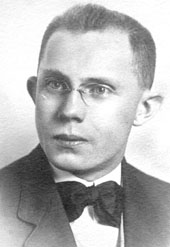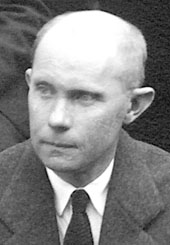
Charles Harold Lyttle (July 16, 1884-May 2, 1980) was a Unitarian minister and professor of Church History at the Meadville/Lombard Theological School in Chicago for 24 years. He was the author of the definitive history of the Western Unitarian Conference, Freedom Moves West.
Charles was born in Cleveland, Ohio to Arabella Eleanor (Jones) and George Herbert Lyttle. His father was a merchant and “freethinker-Unitarian, “his mother a homemaker and an Episcopalian. She brought him up in her faith. In 1902 he graduated from the local public high school where he engaged in classical studies.
After working as a clerk for the Standard Oil Company of Ohio, Lyttle studied at Adelbert College of Western Reserve University. He earned his A.B. in 1907 and his A.M. in English literature in 1908. In 1907-08 he worked part-time in the President’s Office at Western Reserve.
During his college years Lyttle had become more liberal in his political and religious views, finally adopting the faith of his father. As a result, he decided to become a minister and entered Meadville Theological School in Pennsylvania. He graduated in 1910 with a B.D. His senior thesis was “The Church of Antioch before Paul of Samosata.” Meadville awarded him the Harriet Otis Cruft Traveling Fellowship which allowed him to do further religious study during 1910-11 at the Universities of Berlin and Marburg. He continued his studies at Harvard Divinity School, which granted him an S.T.M. in 1913. He was student minister at the First Church, Pembroke, Massachusetts, 1912-14.
In 1914 he was ordained and installed at the Second Unitarian Church in Brooklyn, New York. The president of Meadville, Franklin C. Southworth, delivered the sermon and John Haynes Holmes gave him the right hand of fellowship. Lyttle remembered that during the service, “the electric fuse blew out leaving the church virtually in darkness. Then the sexton fetched the silver candelabra . . . and the reverend gentlemen made their remarks in the glow of twenty or thirty pink candles. It was, I suppose, the most ritualistic moment of my career.”
Lyttle regarded his years in Brooklyn as happy ones. His pulpit style, as noted by a local newspaper, was “serious, thoughtful, reverent, devoid either of declamation or sensationalism.” He continued his studies, planning to earn a Ph.D. in the history of religions. He was Secretary of the Unitarian Conference of the Middle States and Canada, 1915-19, and on the Board of Trustees of Meadville, 1915-25. Although “absolutely opposed to war,” Lyttle believed that ministers should be actively engaged in humanitarian work. Therefore he served as Chair of the Navy Yard District of the Brooklyn Bureau of Charities, 1915-22, and worked with the Red Cross at the Old South Brooklyn Dental Dispensary, 1917-22.
During his Brooklyn ministry Lyttle met Marcia Taft Janes. A graduate of Syracuse University, she taught applied design in the Jersey City High School. They were married in 1922 and had two sons, David and Bradford.
In 1921 Lyttle returned to Meadville to study for his doctorate. While in residence there he was interim minister of the Unitarian Church in Omaha, Nebraska, 1921-22. He was recalled to the Brooklyn parish in 1922. He wrote his Th.D. dissertation there. After his 1924 graduation Meadville asked him to become James Freeman Clarke Professor of Church History. He accepted and left his Brooklyn parish for a second time.
Lyttle taught church history at Meadville and, from 1946-49, modern church history at the Federated Theological Faculty of the University of Chicago. As an unpaid volunteer he directed field work for Meadville, supervising the senior students in preaching and religious education. He served churches in Hobart, Indiana; Shelbyville, Illinois; and the struggling small congregation, the First Unitarian Society of Geneva, Illinois, forty miles west of Chicago. During his ministry in Geneva, 1927-64, he revived the church. In 1942, for the church’s centennial, he wrote the hymn “Church of the Free Spirit.” This hymn was later selected for inclusion in Hymns for the Celebration of Life and Singing the Living Tradition.
Lyttle was an early Unitarian humanist. In 1916 he lectured on “Humanism, America’s Real Religion” at the Cooper Institute in New York City. Although Lyttle was not among the Unitarian ministers who signed the 1933 Humanist Manifesto—he considered it yet another creed—he introduced a generation of Meadville students to religious humanism through his courses and lectures. In his sermon, “Humanism and History,” included in Curtis Reese‘s 1927 collection, Humanist Sermons, Lyttle declared, “The new theology of Man will outstrip the modernist Christianity of today in bringing dignity and beauty to personality, elevation and delicacy to the feelings, clarity and sagacity to the mind, and to conduct, purity and compassion. It will assist in enlarging the areas of peace, justice and humanness in the earth; and then its offspring in turn will be grander than itself.”
Lyttle’s publications include a study of William Ellery Channing‘s Baltimore sermon, Pentecost of American Unitarianism, 1920, and a popular anthology of Channings writings, The Liberal Gospel, 1925. In 1927 he prepared a typescript, “An Attempted Reconstruction of the Records of the Berry Street Ministerial Conference,” which was published three years later in the Quarterly Bulletin of the Meadville Theological School as “An Outline of the Berry Street Ministerial Conference.”
During his teaching career Lyttle wrote several essays including “Our Unitarian responsibility for religious freedom” for Meadville’s Quarterly Bulletin, 1926; “Deistic piety in the cults of the French Revolution” in Church History, March 1933; “The Religion of Early Freemasonry” which appeared in John Thomas McNeil, Matthew Spinka and Harold R. Willoughby, eds., Environmental Factors in Christian History, 1939; and “Genetic tensions of Emerson’s essay on self-reliance,” in Journal of Liberal Religion, 1941. In addition, he regularly reviewed books for Church History and the Humanist.
Lyttle’s major scholarly work was his definitive study of the Western Unitarian Conference, Freedom Moves West. Conrad Wright, in his review in Church History, June 1955, perceived that “the real theme of the book is the tension between those who have insisted on Christian theism as an essential part of Unitarianism, and those who have asserted that religion is more inclusive than theism or Christianity.” As such, he judged, “this book will be prized, both for its own very real achievement, and for the basis it offers for further research.”

From 1930 to 1950 Lyttle was a Director of the Unitarian Historical Society. In 1932 he helped organize and served as president of the short-lived Western Unitarian Historical Society. He lectured at its 1935 gathering on “The Canonization of Sir Thomas More, Christian Humanist” and again, in 1937, on the Centennial of the First Unitarian Church in Chicago. He was president of the American Society of Church History, 1939-40. In 1942 he helped to establish the Geneva Historical Society, and served as its president for eighteen years. He was the Executive Secretary, 1937-43, and President, 1946-49, of the Chicago Unitarian Council and Archivist of the Western Unitarian Conference, 1951-80. He served as Vice President of the Chicago Schools Committee, 1947-49, and President of the Hyde Park Cooperative. He was an active member of the Fellowship of Reconciliation, the Wider Quaker Fellowship, the Masaryk Institute, and the Chicago Historical Society.
Lyttle retired in 1949 and was made professor emeritus. When the newly established Unitarian Universalist Association (UUA) sent Lyttle a ministerial form to fill out, with the question “Brief Statement on your Current Concept of the Liberal Ministry and the Role of the Liberal Church in Today’s Society,” he replied: “I think my ministerial record speaks for itself.”
In his ninety-fifth year, Lyttle died of cardiac arrest at Illinois Central Hospital in Chicago. His beloved wife survived him. A memorial service was held at his old parish in Geneva.
Sources
Lyttle’s papers are at the Meadville/Lombard Theological School Library in Chicago, Illinois and his UUA ministerial file is at the Andover-Harvard Theological Library in Cambridge, Massachusetts. Also there are pictures (including the pictures above) and the notes taken by Meadville student Joseph Barth from Lyttle’s 1930 lectures. In the archives of the Beacon Press at Harvard are three files relating to Freedom Moves West. The Liberal Gospel was reprinted in 1981 by the Unitarian Universalist Association and in 2006 Freedom Moves West was issued in a revised edition by the Unitarian Universalist Historical Society and Blackstone Editions. See also Who Was Who in America, vol. 7 (1977-81) and the General Catalogue of the Meadville Theological School (1844-1944). Obituaries are in the UU World (June 1, 1980); the UUA Directory (1981-82); the Chicago Tribune (May 7, 1980); and the New York Times (May 8, 1980).
Article by Alan Seaburg
Posted October 10, 2006